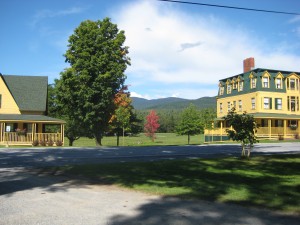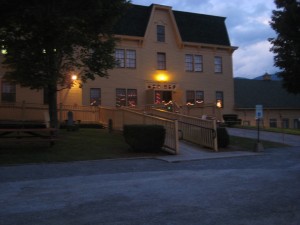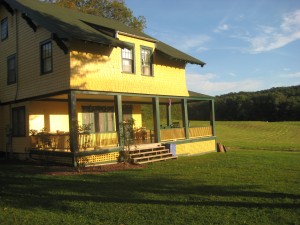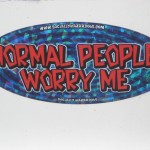I’m Leaving in a Mini-Van
The mini-van is actually a clapped out jalopy. When I take her into the local Firestone place down the street for inspection she is tucked way in the back. Parked, I kid thee not, next to the dumpster. People who are car-proud usually keep them sticker-free. Here are some photographs of the crazy stickers on the back of mine.
Anyway, I’m leaving in this Mini-Van today and heading out to the place in America where, I hope, when I am dead, my ashes will be scattered: Bread Loaf in Ripton, VT. This is where, for the past five years, I have had the enormous good fortune of attending the Bread Loaf Writers’ Conference. It is the first place where I ever sat in a workshop – which ended up resulting in the beginnings of my first novel. It is the place where I grew most into the parts of myself that I love, in my writing as well as in my personal life. The place where I felt completely at home and affirmed for the best iterations of my personality and where whatever was dark could be laid to rest. I will try to blog from there but I cannot promise to do so; there is an inviolable trust among its participants that I am not willing to break. But perhaps I will be able to write about the impact of a reading, a lecture or provide a guest post from a friend or two that will communicate what it means to be there.
Bread Loaf is unique for the fact that it is a conference where writers come to be around other writers rather than to write. Of course people come to Bread Loaf hoping to meet agents, make connections, and get their books published – I certainly did – but sooner rather than later, this desire is replaced by the realization that the best thing that can happen to a writer is to fall freshly in love with the art-form.  The campus is situated on a loaf-shaped mountain in the village of Ripton, inaccessible by cell-phone – unless one chooses to go and perch upon a particularly craggy rock in the significantly tall grass, but why would you? There are pay-phones of the variety that is hardly ever seen anywhere these days, and phones linked by a network in small cottages which ring with a sound that most people in high school now would never have heard in their lives. Few Bread Loafers use the phones, in the end. There is wireless access in some spaces, and people will send the occasional email home, but there is very little time or, indeed, desire, to communicate with the world outside Bread Loaf.
The campus is situated on a loaf-shaped mountain in the village of Ripton, inaccessible by cell-phone – unless one chooses to go and perch upon a particularly craggy rock in the significantly tall grass, but why would you? There are pay-phones of the variety that is hardly ever seen anywhere these days, and phones linked by a network in small cottages which ring with a sound that most people in high school now would never have heard in their lives. Few Bread Loafers use the phones, in the end. There is wireless access in some spaces, and people will send the occasional email home, but there is very little time or, indeed, desire, to communicate with the world outside Bread Loaf.
The conference takes place over ten days and is charged from the get go with a schedule that brings the campus together for no less than four readings and a lecture by its distinguished and relentlessly gracious faculty and fellows each day alongside workshops in poetry, fiction and literary non-fiction, and craft-classes and panels and special talks and social gatherings. Most evenings are also given over to late-night readings by the amazingly talented waiters and staff (to which group I have belonged for the past three years as well as this), its accomplished scholars and fellows (Jhumpa Lahiri was a fellow  – the year her Pulitzer Prize-winning collection came out), as well as its faculty. Readings in the famous, and famously Spartan, Little Theater, go on until around ten thirty or eleven on many nights. There are also themed readings in the Blue Parlor, handled for the past three years and again this one, by the talented Nina McConigley whose book will undoubtedly be out soon. And there are informal readings arranged by conference participants during the day. And parties, and meals and conference-wide receptions and dances all of which revolve around being with and around and about writers and writing.
– the year her Pulitzer Prize-winning collection came out), as well as its faculty. Readings in the famous, and famously Spartan, Little Theater, go on until around ten thirty or eleven on many nights. There are also themed readings in the Blue Parlor, handled for the past three years and again this one, by the talented Nina McConigley whose book will undoubtedly be out soon. And there are informal readings arranged by conference participants during the day. And parties, and meals and conference-wide receptions and dances all of which revolve around being with and around and about writers and writing.
If I had to pick the one thing that made the dream possible, it was this one place. There’s a detoxifying atmosphere to Bread Loaf. Being exposed to 200 plus incredible writers at all levels of their career is like taking your seat among the blessed. You get a snapshot of the literary exercise, the journey, from before it  began to where it will still go, before you existed and after you are gone, and it is both sobering and heady. How can you compare anything to being able to stand and read from your very small contribution to the literary endeavor, in the same place where writers like Robert Frost, Toni Morrison, Eudora Welty, Anne Sexton, William Meredith, May Sarton, Ralph Ellison, Sinclair Lewis, Wallace Stegnar, Carson McCullers, and Edward P. Jones and a hundred others, have stood to read from their work long before they achieved greatness in their chosen field? A plain theater, hard seats, one light on a wooden rostrum and nothing but your words in the air, nothing but people who love words listening.
began to where it will still go, before you existed and after you are gone, and it is both sobering and heady. How can you compare anything to being able to stand and read from your very small contribution to the literary endeavor, in the same place where writers like Robert Frost, Toni Morrison, Eudora Welty, Anne Sexton, William Meredith, May Sarton, Ralph Ellison, Sinclair Lewis, Wallace Stegnar, Carson McCullers, and Edward P. Jones and a hundred others, have stood to read from their work long before they achieved greatness in their chosen field? A plain theater, hard seats, one light on a wooden rostrum and nothing but your words in the air, nothing but people who love words listening.
For me, Bread Loaf = heaven.








Yes, for me, too.
Hello Ru Freeman–
May I please (directly) quote you, from your 2009 account, “I’m Leaving in a Mini-Van” ?
Right now, I’m deep-in-the-process, of applying to the 2011 Bread Loaf Writers’ Conference– answering the question:
“What do you hope to gain from the Conference”: trying to say what I feel about being there, but struggling with it.
A friend of mine, last night, looked over what I wrote and said that I seemed to know what I wanted to do after attending Bread Loaf– but needed to expand on what I hope to accomplish while there (since this would be my first time).
Since applying early is “strongly encouraged,” I’m hoping to have everything in by this Friday (01/28/2011).
Your words describing Bread Loaf were electric: conveying exactly, what I would hope to experience when actually there!
Thank you very much.
By the way, I’m applying for a Work/Study scholarship, besides as a General Contributor– and yes, I’ve seen the acceptance-rate (6%) for those spots:
I’d ask friends and family members to say, “break a leg,” but then, I’d make a pretty lousy waiter!
Deborah